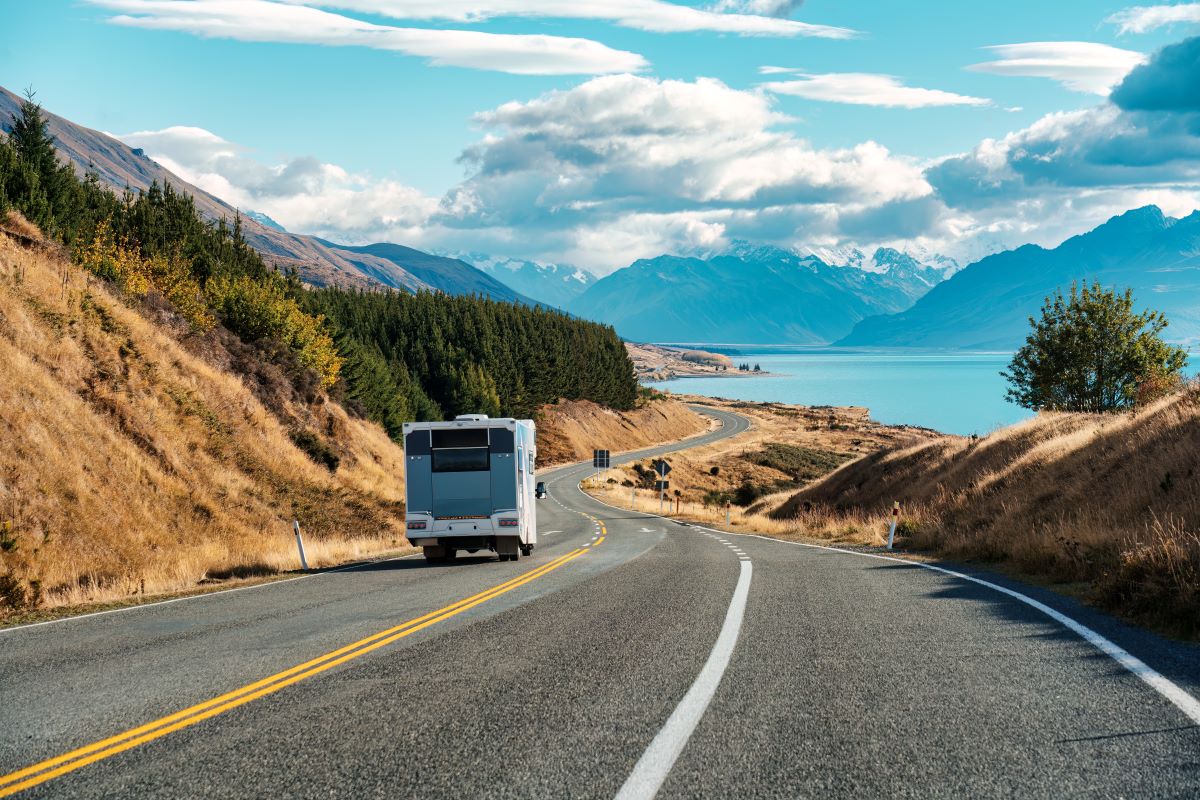With retirement comes the freedom to set off on the adventures you’ve always imagined. Motorhoming is a flexible, fun, and affordable way to see the country, and with peace-of-mind essentials like the GO Pendant medical alarm device as backup, it’s accessible to everyone.
Whether bought or rented, a motorhome is almost a rite of passage for Kiwi retirement. To make your trip or trips as smooth, safe, and memorable (in a good way) as possible, it’s important to be prepared. Be equipped for success and good times as you begin your journey with some helpful pointers.
Choose the right motorhome
Picking the right motorhome for your planned adventure is crucial. Although smaller generally means cheaper, for retirees and older people the added comfort and space of a bigger motorhome is often worth the cost. Of course, bigger vehicles are also trickier to drive, so make sure that it comes with mod-cons like power steering (obviously), reversing cameras, electronic stability control, cruise control, and large adjustable wing mirrors. Take note of the beds, the bathrooms, and the cooking facilities. Is there room enough for a comfortable sleep? Can you sit comfortably on the toilet, and take a shower? Will you want to do a lot of cooking, and is the van equipped for this?
If you’re buying a motorhome, we highly recommend renting one or two for short trips to get a feel for what you like, what you don’t, and what’s a must-have. This is a valuable investment that will help you to make an informed decision on a large purchase!
Pick your parks in advance
Not all campsites in New Zealand are created equal! They range from holiday parks, which generally offer full shared bathroom and kitchen facilities, to Department of Conservation sites with a longdrop and a river. Do your research beforehand and decide which level of amenities you need to enjoy a relaxing trip.
Although some sites will allow you to show up and stay, this is never guaranteed. We recommend booking in advance to reserve a spot wherever you go. Freedom camping is permitted in New Zealand for certified self-contained vehicles only, and the different regions are governed by their own bylaws and restrictions, so determining where you can camp for free is a difficult prospect. If you’re happy to go without amenities, we suggest asking about freedom camping at a visitor info site, or booking basic DOC campsites (these are very affordable) to be sure of your spot.
Take it slow and steady
Although you probably could drive from Auckland to Wellington in a single day, we wouldn’t recommend it. This is the time to take things slow, enjoy the scenery, and smell the flowers. A long drive can sap your energy, so plan for just a few hours on the road each day and make the most of the journey as well as the destination.
One of the most wonderful things about motorhome travel is the fact that you’re bringing your kitchen with you, and this means a cup of tea or coffee is always just a few minutes away. Pull over on a scenic stretch, put the kettle on, and take it all in.
Drive safe
Driving a motorhome is trickier than driving a car, and any issues with vision, mobility, or health can potentially add to this. This isn’t to say you should be put off by the prospect of getting behind the wheel of a big vehicle; just make sure you’re being proactive about safe driving practices. These might include:
- Take time to get accustomed. Find a quiet area near the place you pick up your motorhome and practice driving it, getting used to the size and handling.
- Drive slow and let others pass: yet another reason not to pack your itinerary too full. Take your time and don’t let your speed creep up on you. There are usually slow vehicle lanes or laybys where you can pull over to let faster vehicles pass by safely.
- Drive during daylight. Night-time driving is more dangerous, with reduced visibility and a higher likelihood of questionable drivers. Add to this the challenge of a larger vehicle than you might be used to, and it’s better to avoid taking to the road after dark.
Be safe
Outside of your motorhome, you’ll have plenty to do. New Zealand is a spectacular country, but parts of it can be remote. Keep in mind these general safety tips:
- If you’re planning a hike, do some research beforehand to ensure it matches your ability level. Tell someone where you’re going and how long you’re likely to be. Pack plenty of food, water, and warm clothes, plus a first aid kit.
- Always wear sunblock, sunglasses, and a hat in summer, and drink plenty of water. Heat stroke and sunburn are both major mood-killers on holiday!
- Take hand sanitiser with you to avoid picking up germs in public spaces.
- Swim with caution. Strong currents and rivers and riptides in the ocean can surprise you. If a beach has surf lifeguards on duty, swim between the flags. If a surf beach has no lifeguards, stay out of the water or very close to shore.
- Leave valuables at home.
Of course, the most important safety tips we can offer is to make sure your Freedom Medical Alarms GO Pendant is on you at all times! This unobtrusive device is an invaluable safety back-up, allowing you to roam freely with emergency help at the push of a button from almost anywhere in New Zealand. If you’d like to learn more about the GO Pendant, our team would love to answer any of your questions: just give us a call on 0800 380 280.

